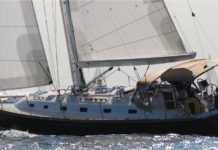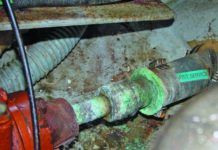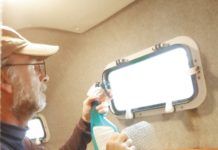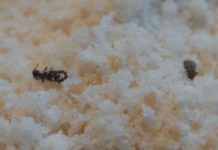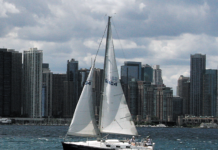On stock production boats, its often said that the primaries are too small, the head needs upgrading and the cabin is poorly ventilated.
The latter is especially important when youre attempting a nap at anchor on a torrid bay containing the most stagnant air outside of the Carlsbad Caverns. Further, the Erysiphaceae and Peronosporaceae, which love stale moist air, may decide that your poorly ventilated boat should be renamed the Mildew Monster. Of course, if youre cooking shrimp, you need a lot of help.
In dealing with any of these air quality problems, the answer is: Ventilation. Ventilation! Ventilation!
You may be stuck with a couple of hatches and too few portlights, but there are other ways to move air when the boat is not underway.
Electric fans are one solution.
Even simpler are various mechanical devices designed to capture and utilize even a slight zephyr. Some of them even generate a bit of air movement because of the old hot-air-rises principle.
Before taking up the mechanical ventilators, lets deal first-and quickly-with some other static ventilation gear reviewed in previous issues.
Bomars ingenious Seabreeze deck hatch was reviewed in the January 15, 1998 issue. The hatch, built around an unusual aluminum extrusion with several seals, permits the movement of air but excludes water. It will move about 6.6 cubic feet per minute or 400 cubic feet of air an hour if theres a 3-mph breeze. Thats not exactly a gale through the cabin, but it will nicely eliminate that fetid odor on a closed-up boat as well as reduce stuffy air when sailing in bad weather with the hatches dogged.
The January 1, 1998 issue introduced a new gadget called the Sea Fan, invented by a couple of New Jersey sailors. Its a fan-shaped piece of 13″ x 15″ polypropylene that can be bent and inserted in a portlight to form an air scoop. Its surprisingly effective…and expensive ($13.95 each, plus $4.95 S&H for two).
Draped hatch screens made of flexible plastic mesh wont amplify the breeze, but will permit half-opened hatches to do so-without inviting aboard any bugs. The semi-fitted Hatchmaster, made by Cleve Horton (he makes Sea Frost refrigeration) made the November 15, 1993 issue. It has a stainless chain around the bottom to keep it in place. There are three sizes, ranging from $29.95 to $49.95. The Canadian-made Bugbuster, very similar except that it uses lead beads in the hem, made the June 1, 1995 issue. Four sizes, $39.99 to $67.99.
Now, taking up the rest of the gear, on the following pages are three articles dealing with (1) fabric air scoops designed to gather up and re-direct the breeze, (2) cowl ventilators, such as Dorades, that do the same thing, as well as mushroom or domed devices that create a vacuum and draw air out of the cabin, and (3) 12-volt cabin fans.
Contacts- ABI, 1160A Industrial Ave., Petaluma, CA 94952; 707/765-6200. Beckson, Beckson Marine, 165 Holland Ave., Bridgeport, CT 06605; 203/333-1412. Bomar, Box W., Charlestown, NH 03603; 603/826-5791. Bugbuster, Sogeman USA, 1320 Rte. 9, Box 158, Champlain, NY 12919; 800/261-9004. Caframo, RR 2, Airport Rd., Wiarton, Ontario, Canada N0H 2T0; 800/567-3556. Carlyn, BOAT/U.S., 884 S. Pickett St., Alexandria,VA 22304; 800/937-2628. Davis, Davis Instruments, 3465 Diablo Ave., Hayward, CA 94545; 510/732-9229. Guest, 95 Research Pky., Meriden, CT 06450-7124; 203/235-4421. Hatchmaster, C.F. Horton & Co., 372 Rt. 4, Barrington, NH 03825; 800/435-6708. Hella, Hellamarine, 201 Kelly Drive, Peachtree City, GA 30269; 877/22-HELLA. Hot Wire, 516 Boca Ciega Point S., St. Petersburg, FL 33708; 727/217-9809. Kool-O-Matic, 1831 Terminal Rd., Niles, MI 49120; 616/683-2600. Martec, Martec Engineering, 2257 Gaylord St., Long Beach, CA 90813; 562/435-4494. Nicro, Marinco/AFI, 2655 Napa Valley Corporate Dr., Napa, CA 94558; 707/226-9600. Paul Luke, Box 816, East Boothbay, ME 04554; 207/633-4971. Plastimo, Simpson Lawrence USA, 6208 28th St., E. Bradenton, FL 34203-4123; 941/753-7533. Rondal, Norseman Marine, 4200 Pointsettia, W. Palm Beach, FL 33407; 561/848-9449. Sea-Dog, Box 479, Everett, WA 98206; 425/259-0194. Sea Fan, New Latitudes, Inc., 166 Prospect, North Arlington, NJ 07031; 201/955-0668. Seafit, West Marine, see below.Vetus, Vetus Den Ouden, Box 8712, Baltimore, MD, 21240; 410/712-0740. West Marine, Box 50050, Watsonville, CA 95007-5050; 800/262-8464.












